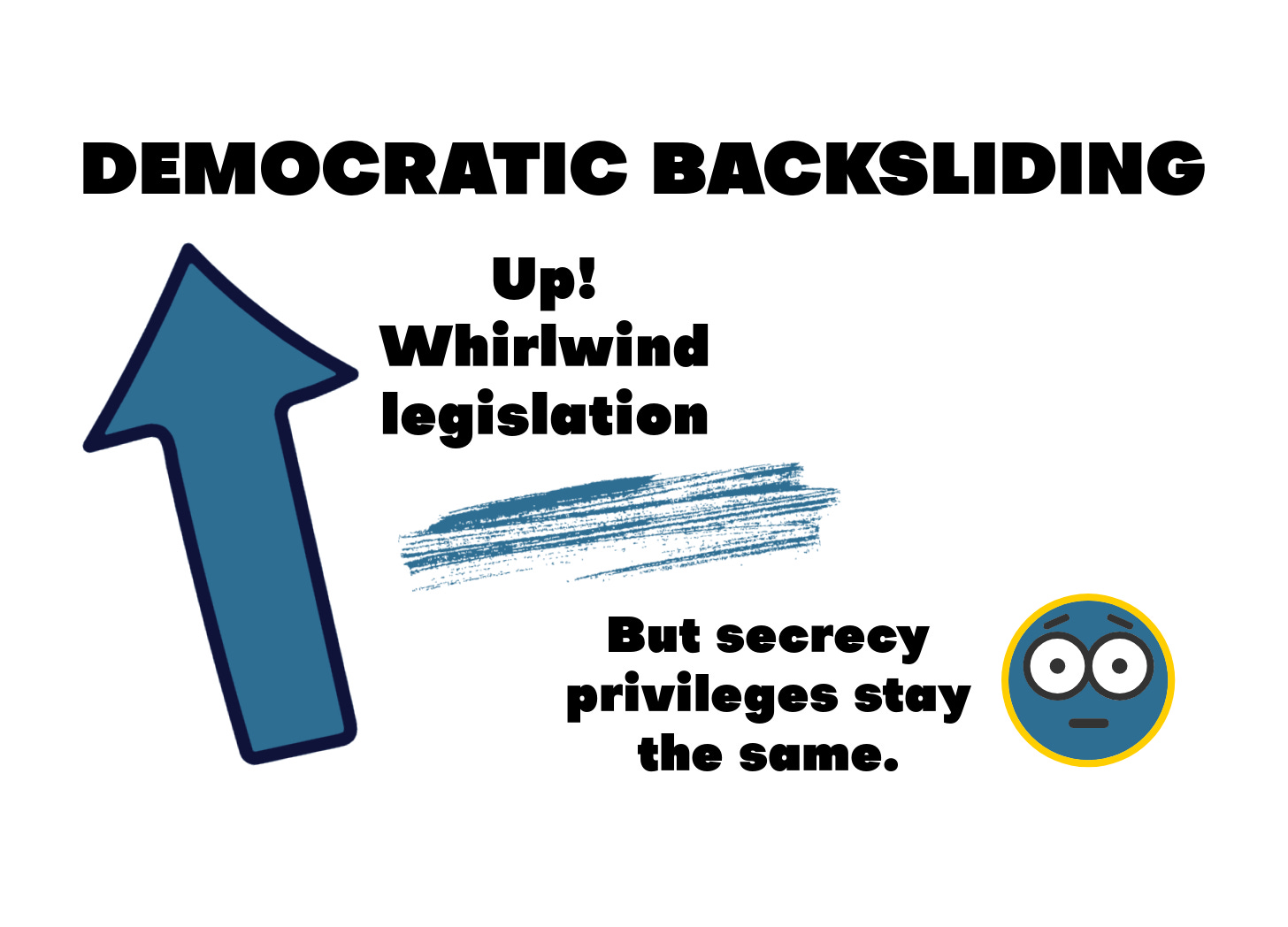Jodie Bruning provides some thoughts on why New Zealand is uniquely vulnerable to abuse of power.

Sociologist Jodie Bruning says Ministers don’t want us to know their decision-making processes.
I’ve just published a long-form article in the Daily Telegraph. It highlights the role of Ministerial secrecy. The disturbing habit in New Zealand, of Ministerial secrecy privileges staying the same, … while legislation is fast-tracked without public oversight.
Evidence for new laws is often flimsy. Sometimes, not publicly declared at all, such as for the COVID-19 response bill; or performatively rose-coloured, such as for the Therapeutic Products Bill or Digital Trust Framework Bill. The impact statements often leave no doubt as to who are the preferred stakeholders.
In the chasm, our authoritarian-in-style Government is increasingly just, well, authoritarian. Ministers do what they want to do. Did the tree really fall in the forest, if no-one saw it happen – and there is no evidence of it?
The ‘legitimate’ media won’t tackle issues that might contradict the super keen view of the Ministers in control of that legislation. Others are stepping up. A recent RCR interview with Katie Ashby-Koppins drew attention to New Zealand’s alarming history of passing bills under urgency. I’ve discussed it here and here. And now I’m discussing how this – combined with secrecy – is not democratic:

Sign up to receive our newsletter
And of course, it’s not just bills being passed under urgency. It’s the capacity for Cabinet Ministers to create Orders in Council swiftly and secretly. Thereby placing powerful weapons into Ministerial hands – with no proper scrutiny. Such easy weaponisation of statutes creates secret, Unbridled Power – the power of a tyrant.
In secrecy. They don’t want us to know their decision-making processes. At all.
The reason I went back to university after 20 years was to study the capacity for scientists to do important, broad-ranging research exploring the drivers of chronic disease. I’d spent many years identifying the underpinning studies that ‘prove’ safety of commonly used chemicals and biotechnologies. I was increasingly aware of the scientific evidence (in the peer-reviewed literature) that contradicted safety claims. But where were the scientists taking issue with the ‘bent’ science in our public media and in other public platforms?
Sociology revealed a vast literature drawing attention to the methods and patterns by which corporations, governments and regulators delay, deny and dismiss scientific and technical information that contradicts their position.
Technology is persistently under-regulated. When it comes to synthetic chemicals and biotech, emissions vastly exceed societies capacity to monitor and regulate them. Everyday, the evidence that the science that regulatory scientists use, vastly lags behind the ways and means scientists today use to identify how environmental chemicals drive health harm, accrues.
Unfortunately, regulatory scientists stay locked into old-fashioned, linear, toxicological models that conveniently – for the chemical industries – ignore both accumulative adverse effects over time and combined adverse effects with other substances. This ‘neat and tidy’ system works perfectly for the so-called regulatory industry.
Before I went back to university, I was one of dozens of citizens presenting to district, regional and city councils highlighting the evidence of harm in the peer-reviewed literature relating to the chemicals citizens are exposed to, without their permission, and often without their knowledge, in urban environments today.
I observed that no matter what compelling science was served up to demonstrate a high probability of risk, and therefore harm, it disappeared into the ether. It went nowhere. No matter the days and weeks spent accumulating such evidence, it would be brushed off. Most times, it would be refuted by the claim that the over-arching authorities state that it is safe.
My research enabled me to identify how the New Zealand government vastly under-funds public-good science and research. Yet such public-good scientific research is a primary foundation for a government to act to protect its citizens – the most important role of Parliament and an elected government.
Enormous swathes of law are dedicated to main-streaming technology into daily life. But science that might draw attention to the contradictions and risks is simply not funded. The underfunding of science inevitably supports arbitrary State policy-making while also eliminating dissonant scrutiny; thus allowing market release of dangerous substances and products. The corporations (as applicants) supply the secret science, and the corporations directly profit.
Such government conduct thus supports big corporations – while at the same time abandoning its primary elected role to protect the public.
Such conduct renders Parliamentary powers into the category of a sham.
Where there is no flame there is no fire. There can be no contradictory science that challenges regulatory orthodoxy, the status quo and the current political and economic trajectory.
Therefore, very few scientists will participate in activity challenging the socio-scientific processes of policy and law development. Because of the underfunding, mid-career scientists won’t risk their neck, and only few late career scientists are sufficiently motivated and courageous enough to step outside of peer networks.
All the old tricks to ignore inconvenient science are established and active here in New Zealand: accelerated by rapid-fire new statue-making of Ministerial powers to make unaccountable orders at scale and pace.
What was frightening was the change in scale and production of the pace of new legislation.
Why do officials and Ministers do it? Because they can. The historical, social, cultural journey of a thousand cuts that results in a captured Ministry or agency serving industry, has been covered by many before me.
When Pfizer and BioNTech trotted up with a novel bioengineered genetic therapy (‘an inoculation’ that was misleadingly called ‘a vaccine’), the odds were that whatever government decided to do would happen; no matter what the contradictory scientific evidence stated. Legal and public health principles could be effortlessly dropped.
There was no Parliamentary agency that could take the initiative to protect these principles. Even the Children’s Commissioner, who could not contemplate the fact that not-at-risk children and young people should not, on principle, be exposed.
This was a business. Like a detective, all officials had to do was chase the case and elimination would happen.
Sign up to receive our newsletter
But in COVID-19 it was the secrecy of Cabinet, the privilege of hiding important conversations. Cabinet had at hand new-generation technology tools of public surveillance, monitoring and control that could be weaponised to assert its secret decision-making. A tyrannical government was well-equipped.
1. a person who governs oppressively, unjustly, and arbitrarily; despot
2. any person who exercises authority in a tyrannical manner
Such secrecy around Cabinet and its advice from officials and ‘expert’ committees produced profound barriers to any public scrutiny of government decision-making processes. The secrecy of the officials and committees. A similar level of secrecy was built into supplier contracts for supply of mRNA technology and other newly minted treatments for the pandemic.
The secrecy of the most powerful people in New Zealand, the Ministers (including the Attorney-General) and the heads of departments. That shroud of secrecy reflected back into muzzling all public servants. That shroud of secrecy enabled the Attorney-General to sign off on legislation that took away peoples’ rights to protect their own bodies.
It was in this way that the New Zealand bestowed unparalleled privilege on Pfizer and BioNTech.
The question arises whether New Zealand civil society will have capacity to contest future measures – where the technology is new, and contested, and there is indication that the adoption of that technology might enhance the potential for major abuse of power.
New Zealand is a less litigious nation than many, and there are no financial pathways to support citizens who wish to legally contest policies that are politically attractive to central government. Scientists are caught by the short and curlies. New Zealand’s Parliament is unicameral and Ministers hold startling power, particularly when they hold multiple portfolios and hop across them.
In addition, instead of being an official of Parliament with a primary role to uphold the rule of law and peoples’ rights, diseased processes in our shaky constitutional habits have tolerated our Attorney General as also acting as a political Minister-of-Government – the worst possible conflict-of-interest for the protection of people in New Zealand.
Please read about the barriers to us knowing, why, how and what they are doing, even moments of incontrovertible contradiction:
IS IT CULTURE THAT IS THE PROBLEM?
In the Daily Telegraph I quote Dr Samantha Crompvoets. In her book Blood Lust, Trust and Blame, Crompvoets suggests that it is the rules of the game that enables the culture to persist. However, Crompvoets experience serves as a warning. When cultures and rules are explored too deeply, the kickback from powerful sectors, can be considerable.
Power and knowledge, or rather the concealment of knowledge – secrecy – are two significant predictors of misconduct that can be seen in a number of institutional contexts.
Sign up to receive our newsletter
J.R. Bruning is a sociologist (B.Bus.Agribusiness; MA Sociology(Res)) based in the Bay of Plenty, New Zealand. Bruning’s primary research focus is on the relationship between governance, policy, and the production of scientific and technical knowledge for public good. Other writing can be found on JRBruning.Substack.com and at TalkingRisk.nz
The views expressed in this article are the author’s own and do not necessarily represent or reflect those of The Looking Glass.